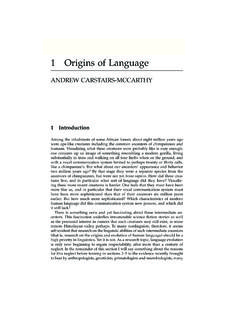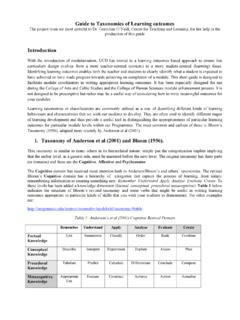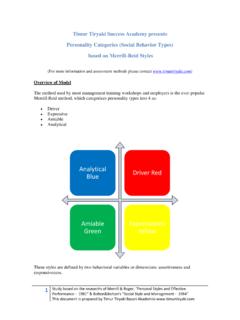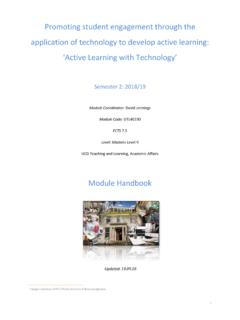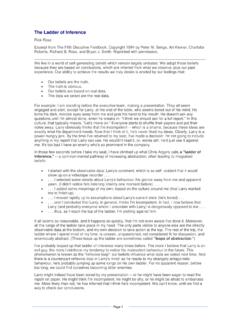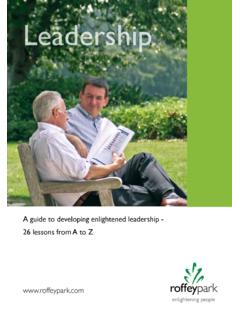Transcription of 2 Literature Review on Attitudes towards Disability
1 2. Literature Review on Attitudes towards Disability Disability Research Series 9. Literature Review on Attitudes towards Disability Literature Review on Attitudes towards Disability Senior Researcher NDA: Frances Hannon Literature Review on Attitudes towards Disability Table of Contents Executive Summary 2. 1. Introduction 5. The role of the NDA in monitoring Attitudes to Disability 6. The need to investigate Attitudes 7. Defining and understanding Attitudes 9. Social desirability/appropriateness and measuring Attitudes 10. 2. Monitoring Attitudes to Disability at home and abroad 12. The Irish surveys in an international context 13.
2 Awareness of Disability issues 13. Interpersonal relations 15. Fairness, access and opportunity 16. Attitudes to Disability in people with and without disabilities 16. Employment 17. Education 21. Mental Health 23. 3. The Generation of Negative Attitudes 26. The social construction of Disability 27. Low expectations 28. Lack of visibility, ignorance and fear 29. Stigma, stereotyping and prejudice 30. 4. Attitude change 33. Attitude formation and motives for change 34. The Contact Hypothesis 35. Disability awareness training, knowledge and understanding 36. Remove obstacles to achieving human potential 38.
3 Discussion: Where to from here? 40. Interventions to improve Attitudes to Disability 41. Interventions should be wide-ranging 42. Attitudes to Disability of people with disabilities 43. The right to full human development 44. Conclusion 45. References 47. Appendix 1 Methodology 65. 1. Executive Summary 2. Literature Review on Attitudes towards Disability Executive Summary Improving Attitudes to people with disabilities is a key priority of the National Disability Authority. To this end, NDA is committed to regular surveying to benchmark Attitudes in relation to Disability and to date has carried out two such national surveys (2001 and 2006).
4 This Literature Review , carried out by the NDA, places key findings of the second national survey conducted in November and December 2006 in the context of the national and international Literature . Some of the key findings of this Literature Review include the following: Attitudes to Disability around the world W. hile negative Attitudes to Disability persist there is also evidence that Attitudes to Disability are improving in Ireland and worldwide. A. clear relationship between Attitudes and personal experience of Disability was found in both the 2001 and 2006 national surveys in the Republic of Ireland as well as in many other studies world wide.
5 N. egative Attitudes towards intimate relationships for people with disabilities indicate that people with disabilities are still not fully integrated within society. P. eople with disabilities who voluntarily meet with other people with disabilities collectively may hold the most positive Attitudes of all towards Disability . T. he negative Attitudes of people with disabilities towards Disability and other people with disabilities is an area that requires attention as such Attitudes can slow progress towards equality. Attitudes and Employment W. hen appropriate supports are provided employers express positive Attitudes toward workers with intellectual and mental health difficulties.
6 T. he discrepancy between expressed willingness to employ and actually employing people with disabilities in the USA identified in earlier studies appears to be diminishing particularly among employers who were participants of vocational/. supported employment programs. A. service agency between employer and potential employee may be crucial, particularly in the case of employees with intellectual disabilities, improving the employment outcomes of people with disabilities by assisting employers to recognise the potential of employees with disabilities. Attitudes and Education Y. oung people with disabilities attach great importance to being treated sensitively and the same as anyone else, including being listened to and having their views and experiences treated as authentic.
7 3. S chools can actively engage in challenging negative societal Attitudes to Disability T eachers' Attitudes towards students with disabilties have a significant impact on their educational experience Changing Attitudes U nderstanding social constructions of Disability and impairment can help to explain why people with disabilities have been marginalised and discriminated against and can draw attention to what needs to be done to eliminate negative Attitudes . A ttitudes are complex so interventions must also be wide-ranging. I t is important to understand what each intervention can bring to change behaviour and Attitudes and how interventions interlink.
8 C ontact with people with disabilities under particular conditions can reduce prejudice. A ffective ties including forming close friendships appear to be very effective in reducing prejudice D isability Awareness Training is required for all but how it is carried out is important. The impact of Disability awareness training should be evaluated. I n the absence of personal experience and contact the media may play a larger role in determining Attitudes and knowledge than otherwise and, in these circumstances, the need for an enlightened, responsible and non-discriminatory media culture becomes more important.
9 U nderstanding and promoting the values underpinning basic human rights or the basic human conditions required for development - equality, autonomy, dignity and solidarity/social justice - is essential if governments and individuals are to commit themselves to ensuring that each and every person can access the conditions required to live as self-determining individuals. 4. Literature Review on Attitudes towards Disability 1 . Introduction 5. The role of the NDA in monitoring Attitudes to Disability The National Disability Authority (NDA) was established in 2000. One of the 4. priorities outlined in its first Strategic Plan (2001-2003) was to influence Attitudes in Irish society: The Authority will identify and develop public awareness of Disability issues and Attitudes towards people with disabilities and mobilise support within Irish society for inclusive policies and practices.
10 (A Matter of Rights: Strategic Plan 2001-3, 2001, ). The National Disability Authority's 2007-2009 Strategic Plan states, the Authority will periodically undertake research to benchmark Attitudes in relation to Disability ( ). In 2001, the NDA conducted the first national survey on public Attitudes to Disability in the Republic of Ireland. This study examined Attitudes to equality, education, employment, state benefits and public services for people with disabilities. Given the legislative and other initiatives implemented in Ireland since the 2001 attitude to Disability survey, 2006 was considered an opportune time to reassess Attitudes to Disability .
